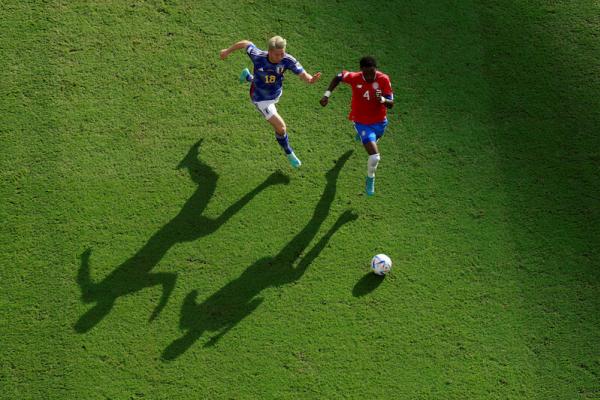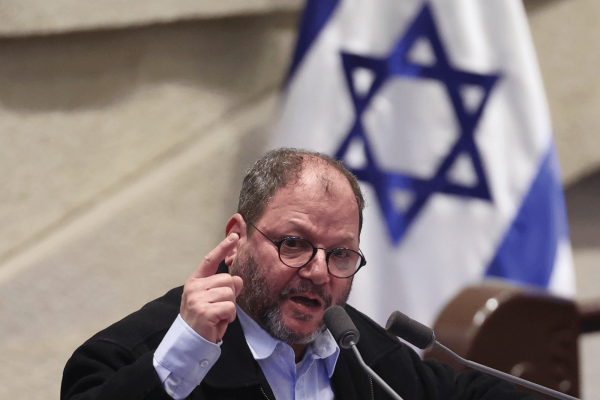Every four years, 3.5 billion people watch the men’s World Cup. For those who prefer words to numbers, that is about half the planet. The 2022 World Cup kicked off on November 20, and both strife and celebration continue to surround the world’s largest sporting event. This year, fans have had to hold the deep joy of watching athleticism and creativity come alive on the pitch alongside realities of labor exploitation and corruption within the International Federation of Football Association (FIFA). Despite these controversies, I have watched this year’s tournament with a close eye. There is a reason one of the most famous goals in soccer’s history — made by Argentina’s Diego Maradona in the 1986 men’s World Cup — is called “The Hand of God.” For myself, and for billions across the world, this game is holy.
The 2022 World Cup is taking place in Qatar, the first country in the Arab world to host the Cup since its inaugural games in 1930. Many were shocked when Qatar won the bid to host in 2010: The small country lacked the infrastructure to host the immense crowd, the desert climate would make play difficult, and rumors of bribes among Qatari and FIFA officials had surfaced. Yet, within the world of international soccer, bribery, greed, and secrecy are nothing new: In November, Netflix released the documentary FIFA Uncovered, exposing deep corruption within the association.
A larger concern about the 2022 World Cup arose in 2013 when reports from the Guardian and Amnesty International exposed exploitation and deadly labor conditions among the thousands of migrant workers who worked on the $220 billion dollar development project to prepare for the games. Because of Qatar’s small population, an entire workforce of “guest workers” from Nepal, India, and Bangladesh traveled to Qatar to build stadiums and transit systems.
Many workers were misled about what type of work they were doing, denied paychecks, and provided with little food and water while they labored in sweltering heat. At least 2,100 Nepali workers have died in Qatar since 2010, according to data collated by Nepal’s labor ministry. But according to The New York Times journalist Tariq Panja, “to this day, no one is able to agree on how many of its members died to get the World Cup across the finish line.” In a sense, these workers have been “lost”: We will never be able to determine the full reality of many of the conditions that led to their deaths. Panja has called these lost workers “The World Cup’s Forgotten Team.”
In addition to turning a blind eye to worker exploitation, Qatar has also continued its discrimination against LGBTQ people and women, resulting in a call for a boycott of this year’s men’s World Cup by celebrities, activists, and world leaders. As a Christian pastor, a justice advocate, and a lover of the beautiful game, I have watched the 2022 World Cup with a heavy heart.
Attempting to address some of these ethical concerns, Guido Tognoni, a previous FIFA advisor, was asked if the organization would ever be able to find an ethical center. “Can FIFA get away from corruption?” he asked rhetorically. “You have to ask if the world can get away from corruption, first. And, I say ‘No, it can’t.’”
My theology teaches me to agree with Tognoni to a certain extent: Currently, the world is full of corruption.
But my faith also teaches me to imagine the world as it should be, on the pitch as it is in heaven. I watch the World Cup for the same reasons I take communion: to connect with the entire world and honor the glory of all bodies. I watch for the way time stands still for 90 minutes when people follow a shared purpose and use their lungs, legs, and hearts to seek that shared purpose. After all, what is Jesus if not a really good team captain who embodies humility and sacrifices for the sake of the common good?
In a United States rife with nationalism, I also watch the World Cup because an international competition that is not completely Eurocentric is a gift, a larger world where American domination is not the norm. After watching one game with my young cousins, I listened in awe as my 9-year-old Messi-obsessed cousin, Dominic, identified every nation’s flag playing in the World Cup. There are 32! At its best, the World Cup teaches us about the world.
Christians who appreciate soccer, when we watch the World Cup, are not only celebrating stunning aerial goals but are also learning about sin and evil. The workers exploited for the World Cup, which ultimately is a purely recreational event, need to be mourned. Migrant labor markets all over the world prioritize money over human lives — including in the United States. We live authentically as people of faith in this corrupt world when we acknowledge sin, challenge the powers that be, and work for change so as to prevent the sin’s recurrence.
Fighting for just labor laws and demanding transparency in FIFA is necessary to participate in soccer with an ethical conscience. We must look with a keen eye at those who hold power over bodies. Whether that be coaches who harm young athletes, or sporting executives who prioritize making money over human well-being, we must look for team captains who, like Jesus, bring out the best in humanity and challenge anyone who does otherwise.
That Advent and the World Cup have coincided this year strikes me as appropriate. Advent challenges Christians to keep the flame of justice alive while waiting for liberation. Advent also invites us to pause before the celebration of victory. And so with the World Cup, we also pause to mourn the reality of the lives lost and wait for a future where people are no longer exploited. As World Cup games continue until December 18, I invite you to learn about both the woes and wonders of the game so many call beautiful. I can’t guarantee that “Goooal!” will become your new “Amen,” but we never know when the “Hand of God” will show up again.
Got something to say about what you're reading? We value your feedback!







